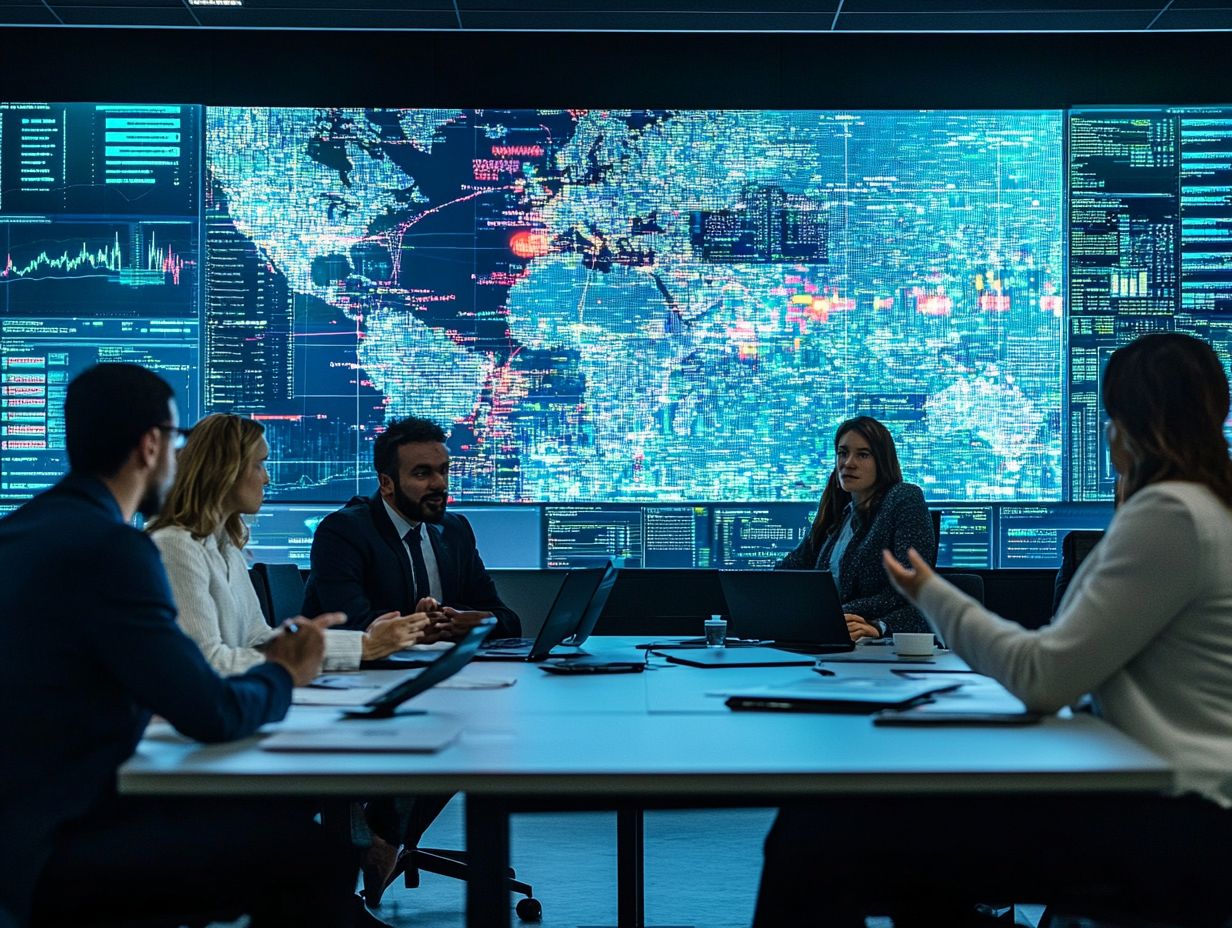the role of managed security in cyber crisis management
In today s increasingly digital landscape, the stakes for cybersecurity are higher than ever. As you navigate a growing array of threats, effective cyber crisis management becomes essential.
This article delves into the pivotal role of managed security in overcoming these challenges, outlining key functions, responsibilities, and strategies for risk assessment, incident response, and recovery.
You ll discover the importance of collaborating with other crisis management teams and explore emerging technologies that will shape the future of managed security.
Get ready to discover vital insights that will enhance your organization’s resilience against cyber threats.
Contents
- Key Takeaways:
- The Importance of Cyber Crisis Management
- The Role of Managed Security in Cyber Crisis Management
- Effective Strategies for Managed Security
- Collaboration with Other Crisis Management Teams
- The Future of Online Safety in Crisis Management
- Frequently Asked Questions
- What does managed security do during a cyber crisis?
- How does managed security support crisis management?
- What are examples of security services for crisis management?
- Why is managed security crucial for crisis management?
- Who manages security during a cyber crisis?
- How can an organization ensure effective managed security?
Key Takeaways:

- Managed security plays a crucial role in effectively managing cyber crises by understanding risks and implementing strategies.
- Collaboration with other crisis management teams is vital.
- Risk assessment, mitigation, incident response, and recovery are key functions of managed security teams.
- Staying updated on emerging technologies and trends is essential to manage and prevent future crises.
The Importance of Cyber Crisis Management
In today’s digital landscape, you cannot underestimate the importance of Cyber Crisis Management. It provides a framework for your business to effectively address and mitigate threats like ransomware, phishing, and insider attacks, emphasizing the role of risk management in cybersecurity.
Implementing effective Cyber Crisis Management creates a comprehensive security strategy. This not only enhances incident response capabilities but also highlights the role of managed security in digital transformation, ensuring compliance with regulatory standards like HIPAA and GDPR.
Cultivating a culture of cybersecurity awareness and training your employees can significantly reduce vulnerabilities. This helps protect your data and safeguards your reputation and operational integrity.
Understanding the Risks and Consequences
Understanding the risks and consequences associated with cybersecurity threats is essential for developing an effective response strategy. Failing to recognize these threats can lead to devastating outcomes, including data breaches that compromise sensitive information.
A data breach can cause big financial losses and lasting damage to your reputation. It erodes customer trust, leaving individuals hesitant to engage with your brand.
Compliance with regulations like PCI DSS, which protects card information, is crucial. Non-compliance may lead to hefty fines and jeopardize your standing in the industry. Managed Security Service Providers (MSSPs) are invaluable allies in navigating these complexities, offering expertise in identifying and mitigating vulnerabilities.
Proactively addressing these risks strengthens your defenses and creates a more secure environment for your business.
The Role of Managed Security in Cyber Crisis Management
Managed Security Service Providers (MSSPs) are essential allies in Cyber Crisis Management. They offer scalable security solutions tailored to help you navigate the intricate world of cybersecurity threats.
These providers offer a comprehensive suite of services, including continuous threat detection and management. This guarantees that your cloud and network infrastructures are well-guarded against various potential attacks, from ransomware to phishing.
By partnering with MSSPs, you can harness advanced technologies and best practices. This significantly strengthens your cybersecurity defenses and ensures compliance with industry regulations.
Key Functions and Responsibilities

The key functions and responsibilities of Managed Security Service Providers (MSSPs) encompass a wide array of activities carefully created to protect your business from cybersecurity threats.
These providers conduct thorough risk assessments to pinpoint vulnerabilities within your organization’s digital infrastructure. This enables them to develop tailored strategies for effective mitigation.
Incident response planning is another crucial aspect. It ensures you have a structured approach to promptly and efficiently react to any security breaches that may arise.
With continuous monitoring in place, MSSPs keep a vigilant eye on your network activities, using tools like Security Information and Event Management (SIEM) systems, firewalls, and intrusion detection systems.
By integrating these cutting-edge technologies, they not only detect potential threats in real time but also ensure that your business stays compliant with evolving regulatory requirements. This enhances your overall cybersecurity posture.
Effective Strategies for Managed Security
Effective managed security strategies are crucial for business leaders, especially if you want to mitigate cybersecurity risks and bolster your overall resilience against emerging threats.
Risk Assessment and Mitigation
Risk assessment and mitigation are key to a strong cybersecurity strategy. They help you identify and address vulnerabilities before they can be exploited.
By systematically evaluating potential threats, you gain a clearer understanding of your security landscape. This process involves recognizing various types of risks and assessing your existing controls to determine their effectiveness at protecting sensitive data.
A thorough risk assessment requires collaboration across different departments, ensuring a comprehensive evaluation.
Once you’ve identified potential threats, you can implement targeted mitigation techniques that align with compliance requirements and industry best practices. This ultimately enhances your security posture while minimizing the risk of data breaches.
Incident Response and Recovery
Incident response and recovery are critical processes in cybersecurity. They enable you to swiftly address and recover from security breaches and threats.
These processes follow a structured approach that begins with detection, where your vigilant monitoring systems identify potential incidents. After detection, thorough analysis is essential for grasping the scope and impact of the threat.
Once you assess the situation, containment measures come into play to limit any damage. Next, eradication efforts are critical for removing any remnants of the threat, ensuring that vulnerabilities are adequately addressed.
Recovery allows you to restore normal operations while extracting valuable lessons from the incident to improve future responses. Bringing in experts quickly is crucial to protect your business from further damage and supports a rapid recovery, ultimately safeguarding your organization s security.
Collaboration with Other Crisis Management Teams

Effective collaboration with other crisis management teams is crucial for a holistic approach to tackling cybersecurity incidents.
By working together seamlessly, you can significantly minimize the impact of these challenges on your business.
Communication and Coordination
Communication and coordination are essential when navigating a cybersecurity crisis. They ensure that every team is aligned and well-informed.
In these high-pressure situations, clarity cuts through the chaos, minimizes confusion, and paves the way for quick decision-making.
Timeliness is just as critical; swiftly sharing accurate information can significantly reduce potential damages and enable immediate corrective actions.
With various departments bringing their unique expertise to the table, effective collaboration boosts your organization s response capabilities and fortifies recovery efforts.
Regular updates and check-ins among teams foster a unified approach, ensuring everyone is on the same page and fully prepared to confront the challenges as they arise.
The Future of Online Safety in Crisis Management
The future of online safety is evolving fast. Emerging technologies are changing how we handle threats.
New Technologies and Trends
Technologies like artificial intelligence (AI) and machine learning (ML) are reshaping security services.
As these advancements grow, your organization will be better prepared to face sophisticated cyber threats. AI tools help quickly pinpoint anomalies and potential dangers.
With ML algorithms, your security continuously improves, adapting to new threat patterns. This not only helps your business respond effectively to incidents but also allows for proactive measures.
By integrating these technologies into your security framework, you can strengthen defenses, speed up response times, and protect your valuable assets more efficiently.
Frequently Asked Questions

What does managed security do during a cyber crisis?
Managed security proactively monitors, detects, and responds to cyber threats. This minimizes the impact of a crisis and ensures operations continue smoothly.
How does managed security support crisis management?
It continuously watches networks and systems for threats, sends timely alerts, and applies security measures to prevent or lessen a crisis’s impact.
What are examples of security services for crisis management?
Examples include 24/7 monitoring, vulnerability management, incident response planning, and disaster recovery planning.
Why is managed security crucial for crisis management?
Managed security is vital because cyber threats are always changing and can greatly affect an organization’s operations, reputation, and finances. It helps reduce these risks and ensures business continuity.
Who manages security during a cyber crisis?
A team of cybersecurity professionals handles security during a crisis. This includes managed security service providers, incident responders, and IT security personnel. Understanding the role of managed security services in cyber defense is essential for effective crisis management.
How can an organization ensure effective managed security?
Organizations can ensure effective managed security by partnering with reputable providers, conducting regular security assessments, and implementing strong security measures to address potential threats.






